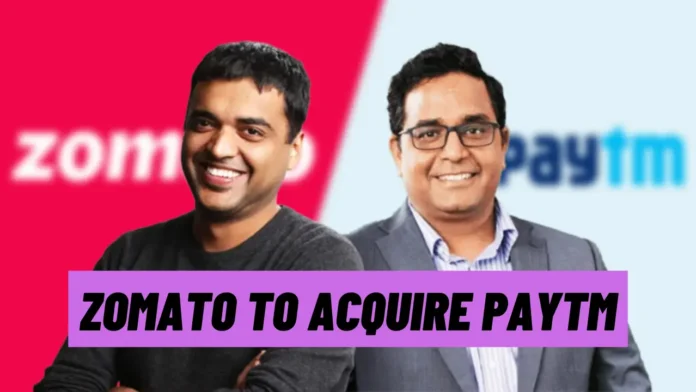In a surprising yet strategic maneuver, Zomato, the renowned food delivery giant, is set to acquire Paytm, India’s leading digital payments platform. This move marks a significant consolidation in the Indian digital landscape and has far-reaching implications for both companies and the broader market.
Key Details of the Acquisition
- Valuation and Deal Structure: The acquisition deal is reported to be valued at approximately $15 billion. Zomato will be purchasing Paytm in a combination of cash and stock, with a substantial portion likely to be in stock, given the valuation scales of both companies.
- Strategic Synergies: The merger aims to leverage Zomato’s extensive user base and Paytm’s robust financial technology infrastructure. This synergy is expected to enhance customer experience by integrating food delivery and payment solutions, potentially creating a seamless ecosystem for users.
- Market Reaction: The announcement has sent ripples through the stock market, with Zomato’s shares witnessing a notable surge. Investors are optimistic about the potential benefits of combining Zomato’s expansive reach in the food delivery sector with Paytm’s dominance in digital payments.
Why This Acquisition Makes Sense
- Complementary Strengths: Zomato’s expertise in the food delivery sector, combined with Paytm’s prowess in financial services and payments, offers a unique blend of capabilities. This integration can provide users with a unified platform for ordering food and making payments, streamlining their digital experience.
- Expansion of User Base: By acquiring Paytm, Zomato can tap into Paytm’s vast user base, which includes millions of users across various sectors such as e-commerce, bill payments, and financial services. This can significantly expand Zomato’s reach and customer engagement.
- Enhanced Data Utilization: Both companies can leverage their combined data analytics capabilities to understand consumer behavior better and offer personalized services. This can drive higher customer retention and open new revenue streams through targeted marketing.
- Innovation and Integration: The merger can lead to innovative solutions such as in-app payment options, loyalty programs, and integrated financial services for Zomato users. It can also facilitate the development of new financial products tailored for the food delivery ecosystem.
- Competitive Edge: In a highly competitive market, this acquisition could give Zomato a significant edge over rivals like Swiggy in the food delivery space and traditional financial institutions in the digital payments arena.
Implications for the Market
- For Competitors: This acquisition raises the stakes for Zomato’s competitors in both the food delivery and fintech sectors. Rivals will need to innovate and possibly consider similar strategic alliances to stay competitive.
- For Consumers: Customers stand to benefit from more integrated and convenient services. The merger could lead to more seamless payment options and potentially lower transaction costs for Zomato users.
- For Regulators: The deal will be closely watched by regulatory bodies for its impact on competition and consumer choice in the market. It will be crucial to see how regulators balance the benefits of consolidation with the need to maintain a competitive landscape.
Future Prospects
The acquisition of Paytm by Zomato is poised to reshape the dynamics of India’s digital economy. It reflects a broader trend of consolidation in the tech and fintech sectors as companies seek to build more comprehensive ecosystems. As Zomato and Paytm work through the integration process, the market will be keenly observing the rollout of new services and the impact on their combined user base.

